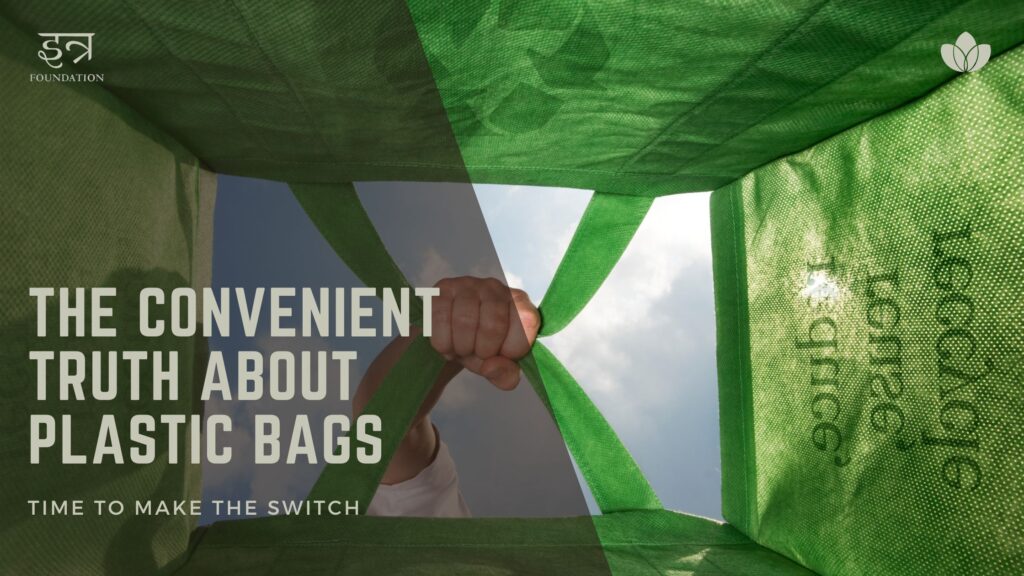Plastic bags have become a ubiquitous part of modern life, but their convenience comes at a high cost to the environment. From production to disposal, plastic bags contribute significantly to pollution and waste, harming wildlife and ecosystems around the world. With the increasing awareness of the environmental impacts of plastic, more and more people are looking for ways to reduce their plastic consumption and make more sustainable choices. One easy way to make a difference is by ditching plastic bags in favor of reusable alternatives. In this post, we’ll explore the environmental impact of plastic bags and why you should consider making the switch to reusable bags. We’ll also offer tips and strategies for making the transition and the benefits you can expect from using reusable bags. Join us as we explore the convenient truth about plastic bags and learn how to make a positive impact on the environment by choosing reusable ones.
Also Read: Celebrating the Year of Millet: A Nutritious and Sustainable Grain
The environmental impact of plastic bags
Plastic bags have become a common sight in our daily lives, from grocery store checkout lines to our trash cans. While they may seem convenient, the environmental impact of plastic bags is significant and far-reaching.
The production of plastic bags requires fossil fuels, which are non-renewable resources. This means that each time we use a plastic bag, we are contributing to the depletion of these resources and the greenhouse gas emissions that come with their extraction and processing.
Once we’re finished with our plastic bags, they often end up in landfills, where they can take hundreds of years to break down. In the meantime, they release harmful chemicals into the soil and water, contaminating the environment and potentially affecting the health of humans and wildlife.
Plastic bags are also a major contributor to litter and pollution. They can blow out of trash cans, landfills, and recycling facilities and end up in our oceans, rivers, and streams, where they can cause harm to marine life and ecosystems.
Overall, the environmental impact of plastic bags is significant and the need to reduce their use and find more sustainable alternatives is clear. By choosing reusable bags instead of single-use plastic, we can make a positive impact on the environment and help protect the planet for future generations.
The alternatives to plastic bags
While plastic bags may be convenient, there are many alternatives that are more sustainable and better for the environment.
One popular alternative to plastic bags is reusable bags. These can be made from a variety of materials, including canvas, jute, and even recycled materials. Reusable bags are durable and can be used multiple times, making them a more sustainable choice compared to single-use plastic bags. They are also often more stylish and can be found in a variety of colors, patterns, and sizes to suit your needs.
Another option is paper bags. While paper bags are biodegradable and can be recycled, they do have a larger environmental footprint compared to reusable bags due to the resources and energy required to produce them. However, they can be a more sustainable choice compared to single-use plastic bags, particularly if they are recycled and reused.
Biodegradable plastic bags are another alternative to traditional plastic bags. These bags are made from materials that are designed to break down in the environment, reducing their impact on the planet. However, the effectiveness of biodegradable plastic bags can vary, and they may still contribute to pollution if they are not disposed of properly.
Overall, the most sustainable choice is to use reusable bags instead of single-use plastic or paper. By choosing reusable bags, we can reduce waste, conserve resources, and protect the environment.
How to make the switch to reusable bags
Making the switch to reusable bags is a simple and impactful way to reduce your plastic consumption and support the environment. Here are a few tips to help you make the transition:
- Keep reusable bags handy: Keep a few reusable bags in your car, purse, or backpack so that you always have them on hand when you need them. This way, you’ll be less likely to forget them when you go shopping.
- Plan ahead: If you know you’ll be shopping or running errands, be sure to grab your reusable bags before you leave the house. It’s also a good idea to have a few extra bags on hand in case you need to carry more items than you anticipated.
- Choose bags that suit your needs: There are a wide variety of reusable bags available, from sturdy tote bags to lightweight produce bags. Choose the options that work best for your needs and preferences.
- Use reusable bags for more than just groceries: Reusable bags are versatile and can be used for a variety of purposes, including carrying books, gym clothes, or work materials.
- Encourage others to join you: Encourage your friends, family, and coworkers to join you in using reusable bags. You can even make it a fun challenge to see who can use the least amount of plastic bags over a certain period of time.
By following these tips, you can make the switch to reusable bags and make a positive impact on the environment.
Conclusion
In conclusion, plastic bags have a significant environmental impact, from production to disposal. We can reduce waste, conserve resources, and protect the environment by choosing reusable bags instead of single-use plastic. Reusable bags are durable, versatile, and stylish, making them a more sustainable choice for various purposes.
Making the switch to reusable bags is easy and can have a big impact. By keeping a few bags on hand, planning ahead, and choosing bags that suit your needs, you can reduce your plastic consumption and support the environment. Encourage your friends, family, and coworkers to join you in using reusable bags and make it a fun challenge to see who can use the least amount of plastic.
By taking simple steps like using reusable bags, we can all play a role in reducing plastic waste and protecting the planet for future generations.





